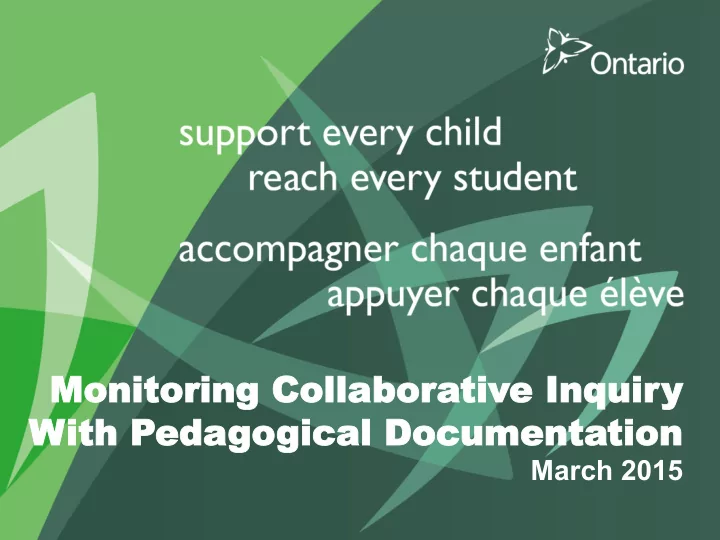

Monit onitor oring ing Colla ollabor borativ ive e Inquir nquiry ion Wit ith h Peda edagogical gogical Document ocumentation March 2015
Overview
Relating Ideas Monitoring Collaborative Pedagogical Inquiry Documentation Pedagogical Documentation Collaborative Monitoring Collaborative Inquiry Inquiry Pedagogical Monitoring Documentation
Collaborative Inquiry Monographs
Pedagogical Documentation Monographs
What is pedagogical documentation? Pedagogy is the understanding of how learning takes place and the philosophy and practice that supports that understanding of learning. ( How Does Learning Happen? p. 16) We define documentation as the practice of observing, recording, interpreting, and sharing through a variety of media the processes and products of learning in order to deepen and extend learning … These physical traces allow others to revisit, interpret, reinterpret, and even re-create an experience. (Visible Learners, 2013, p. 74) … pedagogical documentation is a process for making pedagogical (or other) work visible and subject to dialogue, interpretation, contestation and transformation. (Dahlberg, p. 225)
What is Monitoring? Monitoring is the ongoing gathering , reviewing and assessing of information to track and document progress towards achieving results and goals. Monitoring is also a way of owning one’s learning .
How is framing your inquiry a crucial step in monitoring? INTRODUCTION
“In our culture, we believe that every child is born with gifts. What will our schools do to uncover and develop the gifts of our children?” - An Aboriginal Leader Achieving Excellence: A Renewed Vision for Education in Ontario http://www.edu.gov.on.ca/eng/about/renewedvision.pdf
Reflecting on your Inquiry Question Culture of Inquiry • How does our culture promote risk-taking, dialogue, and co-reflection necessary for our inquiry to flourish? Pedagogical Knowledge • Is the question open with many possible answers? • How will our CI contribute new knowledge? Professional Discourse • How does the question capture the curiosity and passion of the team? • In our professional context, how is our inquiry feasible in terms of time , effort and resources ? Is our CI work connected to our SIPSA? Student Experience • How are students engaged as active partners in our inquiry?
How can viewing CI as a spiral process encourage continuous revisiting of our CI focus? DESCRIPTION
Protocol Considerations • Ensuring that judgement is put on hold during the description phase – “When you said … what did you see/hear that made you think that …?” • Connecting description with specific details to interpretations and implications – “When I saw/heard … it made me wonder if …” • Informing analysis with research, at any phase, is critical for provoking new understanding • Negotiating the tension between taking action versus slowing down to consider multiple viewpoints (Little, 2012) • Facilitation is often required to promote diverse perspectives and to coordinate understanding (Little, 2012)
Teachers’ work is transforming as the kinds of available data multiply and expectations for their use begin to shift. – Little , 2012 Describe your own protocol for examining evidence of student and professional learning. – What challenges do you encounter? – What opportunities exist to go deeper?
How do we ensure our interpretations of student and professional learning are credible and authentic? INTERPRETATION
Checking Your Interpretations Trustworthiness Credibility Applicability Reliability Authenticity New Action Make a Fairness Learning Focused Difference
Ownership of Monitoring When is monitoring collaborative? Collaborative Non-Collaborative • Co-constructed goals • Top-down goal setting • Participatory process • Autocratic process • Accountability for learning • Accountability for learning is shared is externally imposed • Inquiry-stance • Non-reflective • Interpretations attend to • Interpretations and local contexts including judgements are often processes, relationships made in isolation from & change context
How are we engaged as co-learners?
How are our monitoring practices ethical? IMPLICATIONS
Both educators and researchers must negotiate their way amongst the continually flickering shadows of the ethical dilemmas that arise when we work with visual images intended to bring visibility to the lives of children in way that include their voices in a collaborative endeavor. Pat Tarr (2011)
Ethical Considerations human dignity do no harm confidentiality consent privacy maximize benefits vulnerability
Implications for Monitoring Ethically How are our monitoring practices ethical? • How do we represent students in ways that are ethical and respectful? • In our documentation, are we unintentionally “other-ing” learners’ moments of struggle? • How do we engage learners as partners in our own professional learning?
How do the inherent tensions of CI affect our monitoring practices? REFLECTION
Navigating Inherent Tensions of CI Educator Learning Student Learning Educator Problem-solving System-wide Knowledge Generation Process Product Self-Directed System Directed Student Focus Students as Partners What are the implications for our monitoring practices?
Relating Ideas Monitoring Collaborative Pedagogical Inquiry Documentation Pedagogical Documentation Collaborative Monitoring Collaborative Inquiry Inquiry Pedagogical Monitoring Documentation
Thank You • Did today’s session add to your understanding of CI? How or how not? • Did today’s session address your needs? How or how not? • What other areas of CI would you like to explore further?
• Introduction – How is framing your inquiry a crucial step in monitoring? • Description – How can viewing CI as a spiral process encourage continuous revisiting of CI focus? • Interpretation – How do we ensure our interpretations of student learning are credible and authentic? • Implications – How are all engaged as co-learners? • Reflection – Are our monitoring practices collaborative and ethical?
Recommend
More recommend